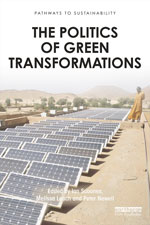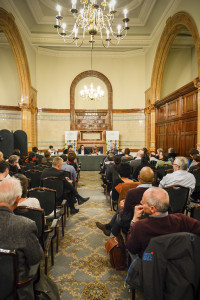It’s a crunch year for science, environment and development agreements – COP21, the Sustainable Development Goals – but will 2015 be the transformative moment it is being hyped as?
(Michael Jacobs, Mariana Mazzucato, Camilla Toulmin and Andrew Simms debate at the book launch. Photo credit: Lance Bellers)
Overview | Book | Launch debate | Video | Blogs |
Resources | Media | Storify | Twitter | Photos
Overview
Technologies such as renewable energy, coupled with market incentives to encourage switching from high-carbon patterns, are being heavily promoted as solutions to avert imminent planetary disaster.
But a new ESRC STEPS Centre book being launched on 24 February, The Politics of Green Transformations, challenges the assumption that green transformations can be either solely market or technology-driven.
Technical and market fixes may help with transitions to greener economies, but it does not amount to transformation, particularly transformation that is both green and just, argue the book’s editors, Ian Scoones, Director of the STEPS Centre, Melissa Leach, Director of the Institute of Development Studies and Peter Newell, University of Sussex.
“Talk of transformation is back in vogue. This time the call is for a green transformation, but what would one look like and who will bring it in to being? While such a discussion implies a key role for technology and markets, it is also deeply political. What makes it political, and which and whose politics will shape the sorts of transformations that are desirable and possible?” they ask in their opening chapter.
From the key role for green entrepreneurial states to the vitality of citizen movements in driving change, the authors assert the green transformation is like no other we have witnessed so far. And it needs the kinds of radical new solutions discussed in this book.
 Book
Book
Multiple ‘green transformations’ are required if humanity is to live sustainably on planet Earth. Recalling past transformations, this book examines what makes the current challenge different, and especially urgent.
Contributing authors
Erik Millstone, Andy Stirling, Matthew Lockwood, Adrian Smith, Adrian Ely, Mariana Mazzucato, Stephen Spratt, Hubert Schmitz, Ian Scoones, Melissa Leach and Peter Newell.
Order the book at a 20% discount online: use code DC361
Launch debate
The Politics of Green Transformations was launched on 24 February 2015 with a high-profile debate at the National Liberal Club in London, chaired by Peter Newell.
Michael Jacobs (IDDRI), Mariana Mazzucato (University of Sussex, pictured right), Andrew Simms (NEF) and Camilla Toulmin (IIED) discussed what it takes to create the multiple ‘green transformations’ required if humanity is to live sustainably on planet Earth.
Watch the debate
- Video of the debate (Short 3min trailer and full debate)
- The debate on Twitter used #gtbook
- Photos from the debate
- Storify from the event
Blogs
To coincide with the launch of the book, we are running blogs about the issues it covers.
- Whose Politics and which Green? The Politics of Green Transformations Peter Newell
-
‘Green Transformations’, Leonard Cohen and the Elephant Guest blogpost by Marc Hudson
- Unpacking multiple “shades of green” to make hope possible Sandra Pointel, 30 July, 2015 (STEPS blog)
Resources
- Andy Stirling’s chapter in the book is based on his STEPS Centre Working Paper Emancipating Transformations: From controlling ‘the transition’ to culturing plural radical progress (pdf)
- The Political economy of the ‘Just transition’ Peter Newell and Dustin Mulvaney
- Globalization & the Environment: Capitalism, Ecology and Power Peter Newell
- The politics of global assessments: the case of the International Assessment of Agricultural Knowledge, Science and Technology for Development (IAASTD) Ian Scoones, The Journal of Peasant Studies Volume 36, Issue 3, 2009
- Democracy in the Anthropocene? Melissa Leach
- Innovation politics post Rio+20: Hybrid pathways to sustainability Adrian Ely, Adrian Smith, Andy Stirling, Melissa Leach, Ian Scoones, Environment and Planning C, 2013 volume 31(6) pages 1063 – 1081
- Grassroots innovation movements: challenges and contributions, Adrian Smith, Mariano Fressoli, Hernán Thomas, Journal of Cleaner Production
- When grassroots innovation movements encounter mainstream institutions: implications for models of inclusive innovation (Submitted version) by Mariano Fressoli, Elisa Arond, Dinesh Abrol, Adrian Smith, Adrian Ely and Rafael Dias Submitted to Innovation & Development in 2014
- Environmental Taxation and Development: A Scoping Study, Stephen Spratt, IDS Working Paper 433
- How Does the Global Power Shift Affect the Low Carbon Transformation? Hubert Schmitz, IDS
- The Entrepreneurial State: debunking public vs. private sector myths, Mariana Mazzucato, Anthem 2013
- Theorising governance and innovation in sustainable energy transitions, Matthew Lockwood, Caroline Kuzemko, Catherine Mitchell, Richard Hoggett – Energy Policy Group, University of Exeter, EPG Working Paper: 1304
Related work
- The Institute of Development Studies’ Green Transformations Cluster
- From Sustainable Development to the Green Transformation – A Rough Guide, Schmitz, H. and Becker, B, IDS
- Media
- Press release from publisher Routledge
- For further information contact:
- Julia Day, STEPS Centre Head of Communications: [email protected] /+44 (0)7974 209148 or
- Katy Kasle, Routledge Marketing Manager: [email protected] / +1 212.216.7835



I’m not sure this blog gives a sense of the ideas needed to get any real green transformation, with the word ‘policy’ omitted. I’m sure the book is better but the impression is of an academic community that professes knowledge it doesn’t really have about a transformation that hasn’t really started.
Market fixes for example haven’t really started. All the supposed market initiatives for climate have made no detectable difference to the suicidal trajectory of carbon concentrations. The policies to fix markets, that should come from academics, are missing SFAIK; stuck in dead-end debates about eco-taxes and the evils of economic growth. We might as well be saying we’re only interested in green transformation if it can be done using the same old ideas that haven’t worked and don’t themselves transform over the years?
It would be good to see blog, books and academic work that acknowledges the gap between the ideas everyone goes on about and the ready-to-use policy proposals that would be needed to create both the market and non-market transformations at the necessary scale and speed. Perhaps I’m missing all this – please let me know!